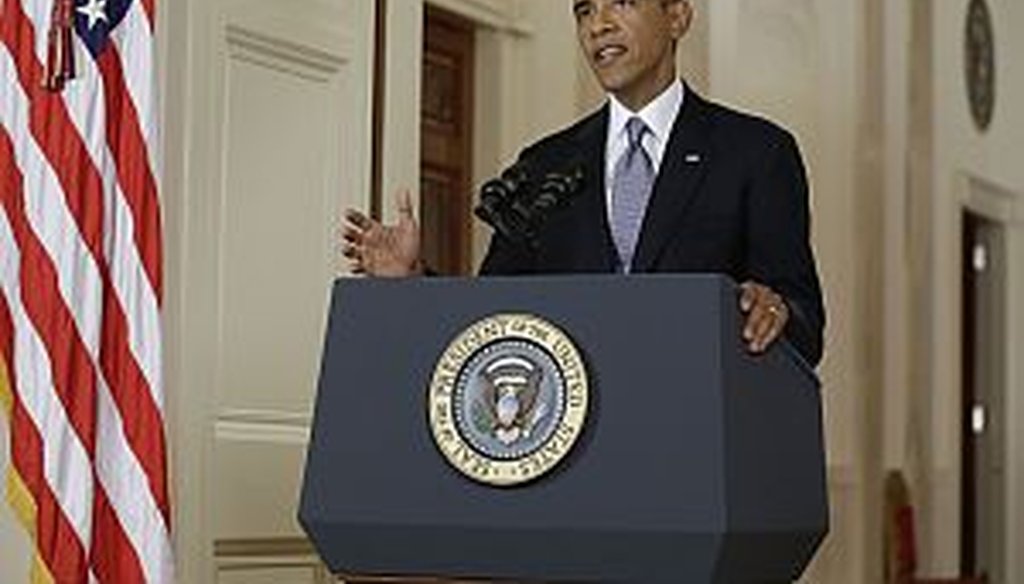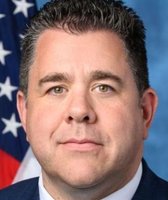Stand up for the facts!
Our only agenda is to publish the truth so you can be an informed participant in democracy.
We need your help.
I would like to contribute

President Barack Obama addresses the nation in a live televised speech from the East Room of the White House on September 10, 2013.
Last updated on Tuesday, September 10th, 2013 at 8:55 p.m.
Should the United States use force against Syria in response to chemical weapons attacks? The the question is riveting Washington and the American public as President Barack Obama makes his case to Congress in anticipation of a vote.
PolitiFact has fact-checked several statements from the discussions around Syria, and we anticipate fact-checking more in the days ahead.
Here’s a guide to what we’ve looked at.
How many times have chemical weapons been deployed in recent years?
Sign up for PolitiFact texts
There have been chemical weapons attacks that the United States has not responded to, said U.S. Rep. Ted Yoho, R-Fla. "If you go back to the Iraq war, it's been used probably 20 times since then, and I just question the motive of right now in America acting out in the lead of this," he told Fox Business Network on Sept. 4, 2013. If you count confirmed chemical weapons attacks by governments since 1990, then the answer is zero. Using looser definitions and a longer time frame gets Yoho to or beyond 20. But experts told us there’s no state attack in the past 20 years that compares with the Aug. 21 attack in Syria. We rated his statement Mostly False.
How long has there been a taboo against chemical weapons?
U.S. Rep. Debbie Wasserman Schultz, D-Fla., is the head of the Democratic National Committee and supports Obama’s plan for military strikes. She said on CNN that such action would make Syrian leader Bashar Assad understand that "his violation of a 100-year-old international norm not to use chemical weapons" would have a "certain and severe response." We looked at her specific claim that an "international norm" is in fact 100 years old. We found agreements against chemical weapons pre-date World War I, but there were early debates about whether the weapons are humane or not. We rated her statement Mostly True.
What did President Obama say about Syria and red lines?
On Sept. 4, 2013, Obama said this about possible action against Syria in response to the use of chemical weapons: "I didn't set a red line. The world set a red line." Didn’t that contradict his words of a little over a year ago? Back then he said, "We have been very clear to the Assad regime, but also to other players on the ground, that a red line for us is we start seeing a whole bunch of chemical weapons moving around or being utilized."
We looked at Obama’s comments in detail in a special report, concluding that a full reading of the questions and his answers show he never denied using the phrase or giving it the significance it has today. We did not rate his statement on the Truth-O-Meter.
Can the president strike without authorization?
Obama is asking Congress to vote on whether the United States can strike Syria; some say he has the authority to act whether he gets approval or not. U.S. Rep. Peter King, R-N.Y., told Fox News that our experience with Kosovo in 1999 is relevant: "The House did vote against engagement in Kosovo, and Bill Clinton kept fighting anyway. And, then, ultimately, a vote did pass." We found that King’s synopsis was mostly on track. President Clinton did keep fighting even when the House deadlocked with a tie vote. The vote that passed later, though, was a spending bill, not a clear-cut authorization. We rated his statement Mostly True.
How many Syrian refugees are children?
John McCain has been sounding the alarm on a humanitarian crisis in Syria for some time now. In an interview on Face the Nation, McCain made the startling claim that 1 million refugees are children. We were surprised by that large number and decided to check it out. We found McCain was right. The organizations that track refugees out of Syria documented that number, so we rated McCain’s statement True.
Did Syrian rebels behead priests and eat a soldier's heart?
"We've seen priests beheaded by the Islamic rebels on the other side. We've also seen an Islamic rebel eating the heart of a soldier," said Sen. Rand Paul, R-Ky., on CNN's relaunched Crossfire. We checked into those dramatic claims and found that a viral video of beheadings does not actually document the death of Catholic priests in Syria. The priest was shot to death, not beheaded. The anecdote of a rebel eating the heart of a Syrian soldier is mostly accurate. On the whole, we rated this compound statement Half True.
Has the United States ever "stood by" in the face of mass civilian casualties?
Sen. Saxby Chambliss, R-Ga., made the case for U.S. involvement in Syria back in June; Chambliss serves on the Senate Intelligence Committee. "The United States has never stood by and seen innocent people slaughtered to the extent that's happening in Syria," Chambliss said on CNN. We found that comment suspicious, so we turned to the history books and found a long list of examples of mass killings where the United States has chosen not to intervene. We found so many incidents that we rated Chambliss’ statement Pants on Fire!
Did the United States ever consider Bashar Assad "a reformer"?
It wasn’t a top issue, but Syria did come up as an issue in the 2012 campaign. U.S. Rep. Paul Ryan, R-Wis., then the Republican vice presidential nominee, charged that the Obama administration went soft on Assad.The administration "called Bashar Assad a reformer when he was turning his Russian-provided guns on his own people," Ryan said at the vice presidential debate. Ryan was referring to comments from then-Secretary of State Hillary Clinton made on Face the Nation, but he miscast Clinton’s words. She said that some members of Congress thought Assad was a reformer, not that the administration specifically had that position. We rated his statement Half True.
Our Sources
See individual factchecks for complete sources.






















































